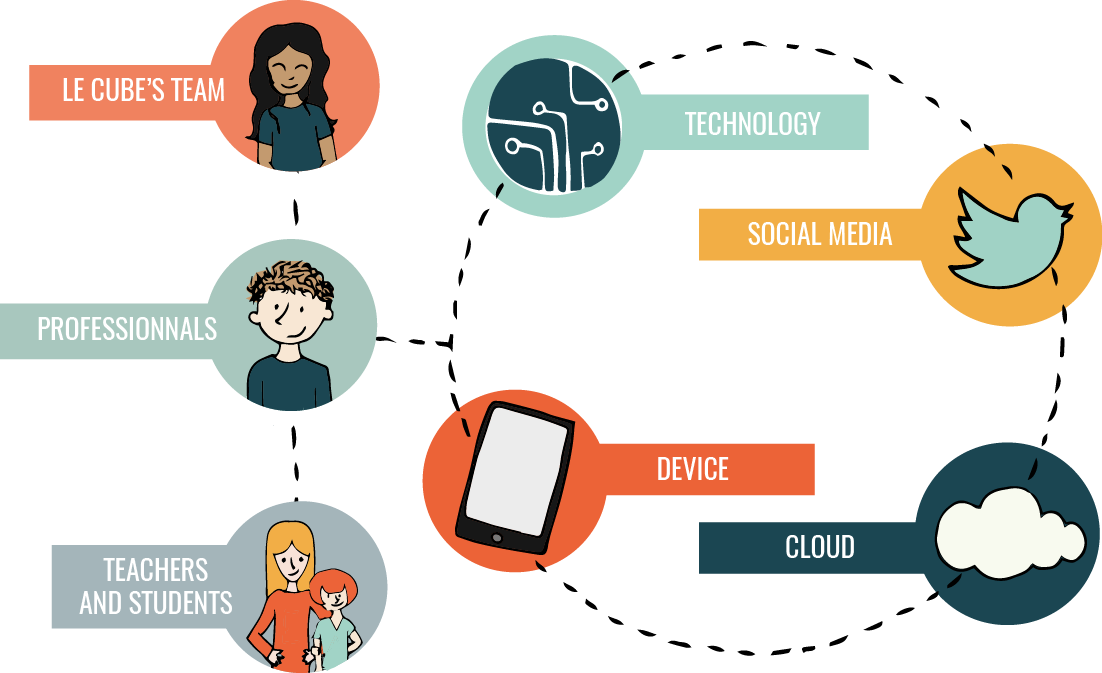
Since 2007, Le Cube has established a “Connect Our Schools” digital education programme within several schools in the Urban Community of South West Paris.
Each year, Le Cube offers students and teachers a collaborative project combining new digital uses and practices, educational goals and territorial issues with projects that have included the Internet of Things, collaborative sites, robotics, “serious game”, augmented reality and digital publishing. During six month, two project managers come directly in the classroom to facilitate and monitor every steps. Moreover they ensure that everything comes in handy to the teachers and students by delivering trainings, methods, technological ressources, manuals and applications that are especially developed for the project.
For every project, teachers and students alike immerse themselves in the digital era. They have access to devices and plateforms in order to explore ideas, store datas, review informations, share results and finally bring the project to life. All necessary informations (planning, contacts, ressources) are also available on every devices due to an efficient cloud computing solution.
DISCOVERING NEW DIGITAL JOBS
Within each project, students face a concrete process and are familiarized to the different problems encountered by real start-ups and young entrepreneurs of the digital sector.
From the idea to its accomplishment, they experience the different steps of project management: creating content, production, integration and public presentations, thus becoming the project’s best ambassadors.
Meeting professionals increases awareness towards new jobs in the digital sector, thus enabling the children to understand and integrate the stakes of the world they will live in once they become adults.
TWEET IN CLASS
For each “Connect our school” project, classes have access to a digital platform allowing students to communicate and interact, especially through blogs they create. Ever since the LuniiLab project, the Cube never ceases to innovate while creating Twitter accounts for schools. Twitter is not the central tool, but it creates a link between the students.
Each class has a Twitter account and can make a record of the project’s development by posting a tweet of each step. A presentation of Twitter is made during the second session in class. This is followed by an initiation to the Twitter “grammar” (concepts such as retweet, hashtag, account identity) through a grid paper of 140 cases.
A guide intended for the teachers has equally been distributed to every classes. Very quickly, students started to tweet and more specifically, to incite other groups to interact and share posts of the work done in class. No recommendation was made to teachers regarding the frequency or the content of these tweets. The only requirement was to intensively use the project’s hashtag in order to enable the centralization of all tweets at the end of the experience.
Teachers chose to designate each week different persons responsible for the tweeting, thus allowing all students to write at least once during the development of the project. This way, students become more responsible and autonomous. Some teachers became accustomed to tweeting several times a week at precise hours, while others chose to tweet only after every work session.
@LeCubeCNE, the official account of the Cube’s digital education programme
In order to coordinate the project and to increase its visibility among the actors of the digital education sector, an account – LeCubeCNE – has been created. Managed by the Cube’s project managers, the account makes the project more visible in networks dedicated to digital communication, innovation and creativity !